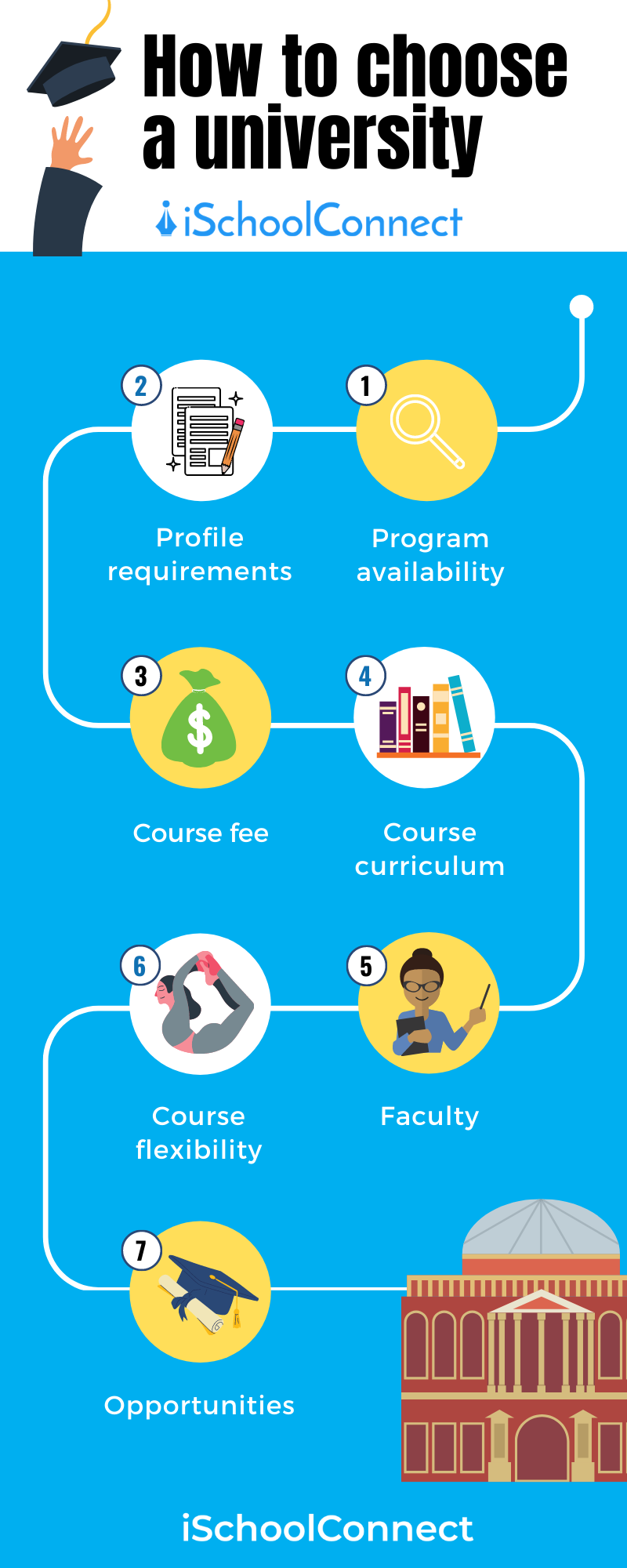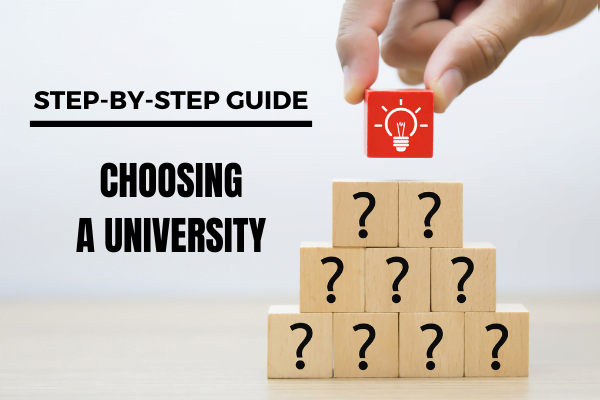Table of Contents
How to choose a university program | An overview
A lot of websites will only tell you what factors to keep in mind when you choose a university program. While some of these points matter (like location, weather, etc.), others should matter more (like cost and faculty). But nobody tells you that.
In this blog, I have shared a detailed step-by-step guide on how to choose a university course. It will give you proper direction, make your research fruitful, and help you shortlist universities the right way. And since I have done some university research myself, you will find relevant examples and insider tips at each step.
So, what are you waiting for? Dive in and look at the best way to choose a university!
Program availability

If you’re reading this blog, I hope I can assume that you have already chosen the course you want to study and the country in which you want to study it.
The program you choose can be as widely available as a Master of Science in Computer Science or as rare to find as a Master of Fine Arts in Creative Writing, and Fiction.
Depending on the country, you can look at a list of universities that have the course you’re looking for. You will find these lists on several websites – like iSchoolConnect, top universities, etc.
I suggest you create an excel sheet and make a list of all the universities you find on your own computer.
For example, if I’m interested in the United States, my list of universities for an MFA in Creative Writing, Fiction will look something like this –
- University of Iowa
- University of Washington
- Indiana University, Bloomington
- University of Texas, Austin
- Syracuse University
- San Jose University
- Ohio State University
- Oklahoma State University
- North Carolina State University
- University of Florida
- Virginia Tech
- University of Arizona
Usually, you will be starting with over 20-30 universities on this list. To keep things clear here, I have only stated 12 universities.
Profile requirements

The next thing you need to do is check if you fulfill the university requirements.
Go to the program page on the university website, read the overview, and look at the ‘How to Apply’ section. Here, you will find a list of the things the university needs. Like your GRE and TOEFL scores, your college transcripts, etc. More often than not, you will also see their admission requirements stating the minimum GPA you should have, what subjects you should have studied before starting this course, and how much you need to score in the standard tests to be eligible.
If you do not fulfill these requirements, strike off that university from your list.
For example, my TOEFL score is 116, my GRE score is 315, and my converted GPA is 3.50 on a 4-point scale. Moreover, I am a science graduate. So, doing an MFA means switching fields, which is not something that all these colleges will accept.
Keeping these conditions in mind, I will have to remove Ohio State University, San Jose University, and Oklahoma State University from my list.
Course fee

The university tuition fee might not be one of the first factors in choosing a college for some, but it is most definitely significant. You will find this information very easily on the course page itself. If you can’t find it, contact the program head and find out.
Apart from that, I also suggest you take a look at the cost of living. It differs from one college to another, depending on the location and whether you want to live on-campus or off-campus. These costs can be found on the university website itself.
In my case, I am looking for fully-funded programs. Since MFA in Creative Writing is a rarer field, many universities provide a tuition waiver, cover your health insurance, and even offer a stipend. This is enough to cover accommodation, food, travel, and other miscellaneous expenses.
This brings my list down to-
- University of Washington
- University of Texas, Austin
- Syracuse University
- North Carolina State University
- University of Florida
- Virginia Tech
- University of Arizona
Course curriculum

Before choosing a university, it’s important to know exactly what subjects you’ll be studying. To find this information, you will have to look at the Course Requirements section of the program page.
The information you find here will only give you an overview of what you’ll be studying.
But if you want to get an in-depth understanding, here’s a trick you can use – go to the Current Students’ Courses section. You will find an extensive list of the subjects offered by the university for your course. You will be able to see what subjects you can take up per semester, how many you are allowed to study, and how much credit you can get per subject.
This will help you rule out the colleges which do not have a curriculum that interests you.
Using this filter, I was able to rule out North Carolina State University (too technical) and the University of Arizona (the subjects are not very interesting to me).
Course flexibility

It’s one thing to know what you’ll be learning and another to be able to study it.
I want you to see how many compulsory subjects and electives you’ll be allowed to take up every semester. This will tell you how flexible your course is. And that’s very important for when you’re looking to study at a university abroad.
Because if you’re paying (even a bit) for your education, you should be able to pick and choose the subjects that interest you. The more a university allows you to customize your course, the better your chances of enjoying it.
When I consider this, my list of universities boils down to-
- University of Washington
- University of Texas, Austin
- Syracuse University
- University of Florida
Faculty

One of the primary reasons we study abroad is to learn from experts and work with them. To be able to do that, it’s important for us to know more about our teachers and how much time they can spend with us.
See what subjects are being taught by whom. Find out if your interests align with those of your teachers. Look at the kind of fieldwork they are currently doing. Check out the student-to-faculty ratio. And if you like what you see, by all means, consider choosing that university.
As for me, I really loved the faculty at all these 4 colleges. So I am not going to reject any of them.
Opportunities

For some students, finding an internship or a job after graduation is the most important factor when choosing a university.
Some colleges have an internship program as a part of their curriculum, while others may allow you to take up an internship in the summer.
When it comes to jobs, you can check out the Opportunities or the Career Prospects section for each of your shortlisted universities. To learn more, you can also check out the Alumni section and see what the past graduate students are now up to.
This will help you get a rough idea of where you might be a few years after graduation and help you make a more informed decision.
Using these factors in choosing a college, I’d go for the following 3 universities-
- University of Washington
- University of Texas, Austin
- Syracuse University
Notice that I’ve been able to shortlist 3 universities out of 12. If you want to apply to start to 6-10 universities, you’ll have to start with a much bigger pool.

Factors you should give less priority to
While researching, getting lost in the rabbit hole and feeling exhausted is easy. You will find it easier to choose a university based on factors that are easy to understand. Like-
- The weather
- Location
- Student and sports societies
- Campus
- Rankings
- How amazing the university website looks (I’m not kidding)
Try to stay unbiased and steer clear of these details. Give higher priority to things like the curriculum and the fees. It’s the more difficult thing to do – I understand. But it’s also the right thing to do.
Oh my God, that’s a lot of research
I have a free AI-based solution for you-
- Go to iSchoolConnect’s website and register for a free 7-day trial
- Fill in your personal details, your academic scores, test scores, and work experience details
- Choose which course you want to study and pick a country
- Click on ‘Get recommendations.’
iSchoolConnect’s AI-based university recommendation engine will give you a list of 6 universities you can apply to.
These recommendations will be based on your interests and profile.
Or you could follow this step-by-step guide on choosing a university course and doing the research yourself.
Regardless of how to shortlist your universities, let me know how it goes. Until then, ciao!
Read more: The Future of University Enrollment
Key takeaways
- A lot of websites will only tell you what factors to keep in mind when you choose a university program.
- While some of these points matter (like location, weather, etc.), others should matter more (like cost and faculty).
- While researching, getting lost in the rabbit hole and feeling exhausted is easy. You will find it easier to choose a university based on factors that are easy to understand.
Was this blog informative? If so, please share your thoughts in the comments below. Click here to reach out to us for more information on how to choose universities. We would be happy to assist you with your queries!
Liked this blog? Then read: How I got into the University of Texas, Dallas | Venkateshwar’s Student Success Story
FAQs
Q1. How do students choose their university?
Answer – 80% of students pointed to one of seven reasons behind their final decision: affordability, desired program, career outcomes, reputation/academic quality, value, proximity to home, and of course, that elusive “fit.”
Q2. What is the main factor for choosing a university?
Answer – The most important factor when considering a college is how the school made you feel. Regardless of all the programs, opportunities, and scholarships, the school you choose should feel like home, a place where you will be able to grow and develop not just academically but in all aspects of life.
Q3. What qualities should a university have?
Answer – A good quality institute blooms in an environment that fosters competitiveness, creative thinking, innovation, and so forth. It provides a learning environment that encourages working on innovative projects in order to promote holistic personality development for nurturing future leaders.







Can you please suggest me the right institution which will give me Scholarship advantage for my fees.
Hi Monika,
That will depend on what your profile looks like, what you want to study, and which country you wish to study in
One of our counselors will get in touch with you to help figure this out
All the best!
Hi team,
I would like to study MS in Computer sceince engineering.
Request you to kindly suggest.
Hey there,
Sure! One of our experts should get in touch with you to help.
You can also call us on +91-9145332283 or drop an email at info@ischoolconnect.com!
All the best.